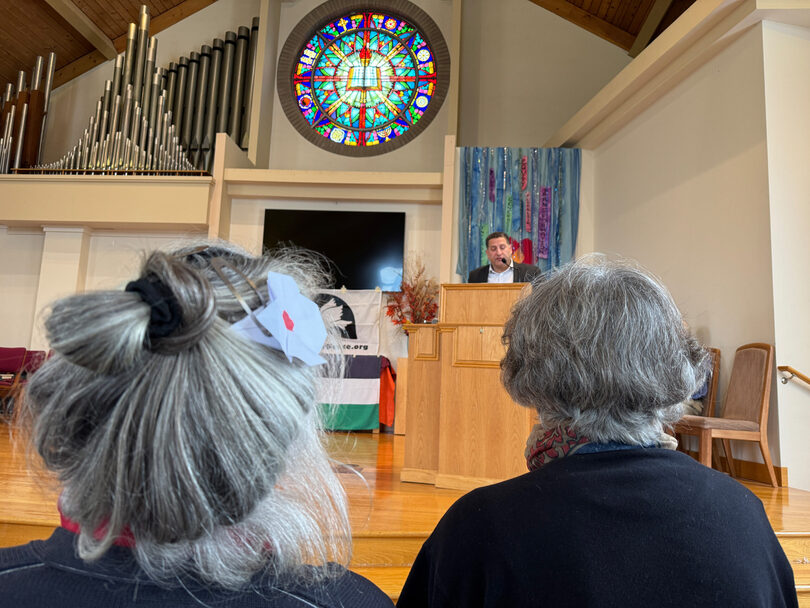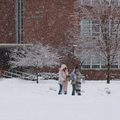‘Reclaim Armistice Day’ celebrants urge peace, not American militarism

Tuesday marked the seventh annual “Reclaim Armistice Day” as attendees gathered to unite against American militarism and honor veterans. Speakers, including a Syracuse University Ph.D. candidate, discussed U.S. military involvement abroad. Laura Lemgruber | Staff Writer
Get the latest Syracuse news delivered right to your inbox.
Subscribe to our newsletter here.
Veterans and allies at Tuesday’s “Reclaim Armistice Day” said they’re taking back Veterans Day as a celebration of peace, truth and resistance in unity against American militarism.
The seventh annual Reclaim Armistice Day focused on the history of American militarism abroad and in the United States in an event co-hosted by the Syracuse Chapter of Veterans for Peace and the Syracuse Peace Council.
Members of the VFP created the event to restore the original intent of the federal holiday — which was to “perpetuate peace through good will and mutual understanding,” according to the original proclamation from President Franklin D. Roosevelt.
In 1954, Congress renamed Armistice Day to Veterans Day. The day was originally dedicated to celebrating the end of World War I and peace. Its focus shifted from a commitment to ending future wars to a day dedicated to honoring those who’ve served, according to the U.S. Department of Veterans Affairs.
“I would like to think that Armistice Day is a reminder of peace in the world, not the ability to go to war,” Thomas Mueller, a third-time attendee of the event, said.
Featured guest speaker Aren Burnside, a Syracuse University Ph.D. candidate, reflected on U.S. involvement in foreign conflicts and how the military-industrial complex continues to impact the broader Syracuse community.
“We should not take these to be a new rise of fascism or militarism, but instead a long-standing tradition within the military industrial complex in the United States,” he said.
Burnside reflected on his experience growing up in Camillus, where he said defense contractors would go into schools to host science camps, tutoring and homework help sessions. Later in life, he watched many of his childhood friends pursue careers as military defense contractors.
“School children are shown that the best and most stable career paths they have is the military,” he said.
These concerns are prominent today, Burnside said, as the community prepares for new microchip plants from Micron Technology in Clay. The company, funded largely by the U.S. Department of Commerce, will produce semiconductors needed to power military vessels like aircraft and ships.
“This reliance on jobs forces Syracuse to be a community in which, economically, people are reliant on military production to survive, in which committing to nonviolence also means committing to poverty,” he said.
Guest speaker and SU professor Osamah Khalil geared his remarks toward the U.S.’s “complicity” in the ongoing war in Gaza. Khalil pointed to financial support the U.S. has provided Israel, and the extensive number of women and children who have died in the war.
“The genocide of Gaza is an American genocide,” Khalil said. “Make no mistake about it.”
He said President Donald Trump’s administration is “unleashing its federal agents at home” with violence against undocumented immigrants and mass deportations.
VFP organizer Arny Stieber shared poetry centered on the toll of war and the dehumanization of enemies with the audience. As a veteran of the Vietnam War, one of his poems reflected on how the government downplays the impact of war on young soldiers.
Attendees said they feel a need for less conflict and more unity. Karen Mihalyi, founder and director of the Syracuse Community Choir, said she left the event with a mix of hopelessness and inspiration.
Throughout the event, the choir performed three songs with an overarching theme of peace. Mihalyi said the arts are essential to uniting people, especially during a time when “rhetoric of hate and fear” plays a predominant role in dividing communities.
She said she recognizes the importance of acknowledging America’s history of militarism, but said discussing war and conflict can take an emotional toll.
“If we aren’t brave enough to take a look, especially us with privilege, then we’re complicit,” she said. “Art and music in particular is necessary, (it’s) the juice that builds a movement that helps sustain social justice movements and keeps us connected.”
Stieber said he hopes the audience walked away from the event not discouraged, but informed of the issues in the country and inspired to resist militarism and violence.
“We’re not going to change the world as much as we’d like to, but we have to stay together,” Stieber said.





